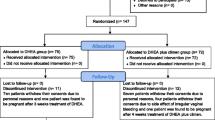Abstract
Introduction
We conducted a randomized, double-blinded, placebo-controlled study, to evaluate the effect of dehydroepiandrosterone (DHEA), on diminished ovarian reserve (DOR).
Materials and Methods
Twenty patients with DOR received DHEA (oral 25 mg three times a day). Post-supplementation 12 weeks, D2/3 age-specific follicle-stimulating hormone (FSH), anti-mullerian hormone (AMH) levels, and antral follicle count (AFC), were repeated to evaluate response. Spontaneous pregnancy rates and regularization of menstrual cycles were also studied as secondary outcome.
Results
Predominant risk factors were age >35 years (28 %) and poor responders to ovarian stimulation (23 %). There was significant improvement of AMH levels (1.15 ± 1.49 vs. 1.53 ± 1.62) found before and after supplementation in the DHEA group. When the AMH values between DHEA and placebo group were compared, pre- and post-supplementation, no significant difference was found. There was decrease in FSH levels and increase in AFC value post-supplementation in both DHEA and placebo groups which was not statically significant. DHEA supplementation benefited clinically, as evidenced by the improvement in the menstrual abnormality spontaneous conception in two cases each.
Conclusions
A significant improvement in AMH levels pre- and post-supplementation of DHEA was noted. The same was not seen for FSH and AFC values.

Similar content being viewed by others
References
Ebner T, Sommergruber M, Moser M, et al. Basal level of anti Mullerian hormone is associated with oocytes quality in stimulated cycles. Hum Reprod. 2006;21:2022–6.
Sönmezer M, Özmen B, Cil AP, et al. Dehydroepiandrosterone supplementation improves ovarian response and cycle outcome in poor responders. Reprod Biomed Online. 2009;19:508–13.
Casson PR, Lindsay MS, Pisarska MD, et al. Dehydroepiandrosterone supplementation augments ovarian stimulation in poor responders: a case series. Hum Reprod. 2000;15:2129–32.
Gleicher N, Barad DH. Dehydroepiandrosterone (DHEA) supplementation in diminished ovarian reserve (DOR): review. Reprod Biol Endocrinol. 2011;9:67.
Wiser A, Gonen O, Ghetler Y, et al. Addition of dehydroepiandrosterone (DHEA) for poor-responder patients before and during IVF treatment improves the pregnancy rate: a randomized prospective study. Hum Reprod. 2010;25:2496–500.
Gleicher N, Ryan E, Weghofer A, et al. Dehydroepiandrosterone (DHEA) reduces miscarriage rates in women with diminished ovarian reserve: a multicenter study. Reprod Biol Endocrinol. 2009;7:108.
Narkwichean A, Maalouf W, Campbell BK, et al. Efficacy of dehydroepiandrosterone to improve ovarian response in women with diminished ovarian reserve: a meta-analysis. Reprod Biol Endocrinol. 2013;11:44.
Gleicher N, Weghofer A, Barad DH. Improvement in diminished ovarian reserve after dehydroepiandrosterone supplementation. Reprod Biomed Online. 2010;21:360–5.
Haydardedeoglu B. DHEA supplementation and ICSI outcomes: was this really randomized trial? Eur J Obstet Gynecol Reprod Biol. 2016. doi:10.1016/j.ejogrb.2016.03.033.
Gleicher N. Randomised controlled trials on dehydroepiandrosterone supplementation in female infertility still not conclusive. BJOG. 2016.doi:10.1111/1471-0528.13945.
Yilmaz N, Uygur D, Inal H, et al. Dehydroepiandrosterone supplementation improves predictive markers for diminished ovarian reserve: serum AMH, inhibin B and antral follicle count. Eur J Obstet Gynecol Reprod Biol. 2013;169:257–60.
Barad D, Brill H, Gleicher N. Update on the use of Dehydroepiandrosterone supplementation among women with diminished ovarian function. J Assist Reprod Genet. 2007;24:629–34.
Author information
Authors and Affiliations
Corresponding author
Ethics declarations
Conflict of interest
None of the authors have any conflict of interest or financial conflicts. The authors have nothing to disclose.
Research Involving Human Participants
All procedures performed in studies involving human participants were in accordance with the ethical standards of the institutional and/or national research committee and with the 1964 Helsinki Declaration and its later amendments or comparable ethical standards.
Informed Consent
Informed consent was obtained from all individual participants, and institutional ethical clearance was obtained for the study.
Additional information
Dr. Rachna Agarwal is Professor at Department of Obstetrics and Gynaecology, Dr. R. Shruthi is Ex-Resident at Department of Obstetrics and Gynaecology, Dr. Gita Radhakrishnan is Director Professor and H.O.D at Department of Obstetrics and Gynaecology, Dr. Alpana Singh is Assistant Professor at Department of Obstetrics and Gynaecology
Rights and permissions
About this article
Cite this article
Agarwal, R., Shruthi, R., Radhakrishnan, G. et al. Evaluation of Dehydroepiandrosterone Supplementation on Diminished Ovarian Reserve: A Randomized, Double-Blinded, Placebo-Controlled Study. J Obstet Gynecol India 67, 137–142 (2017). https://doi.org/10.1007/s13224-016-0941-8
Received:
Accepted:
Published:
Issue Date:
DOI: https://doi.org/10.1007/s13224-016-0941-8




